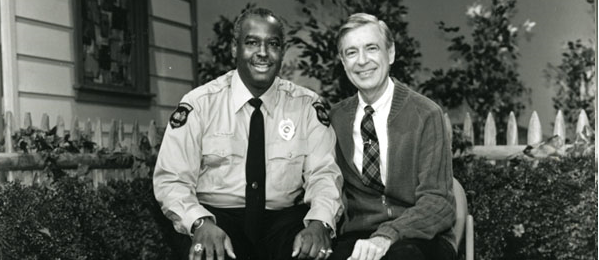Why is it that when tragedies occur, the words of a beloved childhood figure offer comfort?

Fred Rogers, the man who many of us lovingly recognize as “Mr. Rogers”, passed away back in 2003. “Mr. Rogers’ Neighborhood”, the television show that brought him to so many of our lives, stopped production in 2001. Yet over 15 years after Mr. Rogers sang “you’re special just by being you” for the final time, he remains an intriguing and well-regarded media figure. In 2018, a well-watched documentary provided a study on the impact of “Mr. Rogers' Neighborhood”. In 2019, Tom Hanks stars as Fred Rogers in a dramatic biopic giving some behind-the-scenes insight into the man’s life and mission. Mr. Rogers’-themed accounts have tens of thousands of followers on Twitter. And every time we experienced a tragedy or questionable event, there seems to be a Mr. Rogers’-related meme circulated to provide comfort.
Why?
"We live in a world in which we need to share responsibility. It's easy to say, 'It's not my child, not my community, not my world, not my problem.' Then there are those who see the need and respond. I consider those people my heroes." (Spoken in 1994, quoted in his obituary in the Pittsburgh Post-Gazette)
“The world needs a sense of worth, and it will achieve it only by its people feeling that they are worthwhile.”
Perhaps it’s because Mr. Rogers reminds us of the goodness in humanity. His show was built on delivering a personal message to the viewer: you are valuable, you are valid, you are good. So Mr. Rogers sang and spoke words of affirmation--repeatedly.
“When we love a person, we accept him or her exactly as is: the lovely with the unlovely, the strong with the fearful, the true mixed in with the façade, and of course, the only way we can do it is by accepting ourselves that way.”
To send a message of value, Mr. Rogers encouraged viewing the world with eyes of curiosity, appreciation and wonder.
“I believe that appreciation is a holy thing—that when we look for what’s best in a person we happen to be with at the moment, we’re doing what God does all the time. So in loving and appreciating our neighbor, we’re participating in something sacred.” (Commencement Address at Marquette University, May 2001)
That’s why, through the show, Mr. Rogers took us on adventures to mundane places. We learned how crayons were made, we mourned the death of a pet fish, we explored wearing a cast, we processed through what to do when we get mad. Giving topics like these our focus over an entire episode (or more) notes their individual importance. We learned to value many of the things we take for granted or try to push aside. It encouraged a sense of awe with our everyday surroundings.
In exploring the mundane, Mr. Rogers gave us permission to accept where we are and who we are. We didn’t need to aspire to be something else in order to be accepted or even celebrated.
The show helped us to recognize that part of feeling accepted was accepting our own emotions. Mr. Rogers encouraged viewers to feel--and this may be why we feel such an amount of comfort in hearing from Fred Rogers in times of tragedy. His words and witness remind us that it is OK to feel afraid and sad after these events--and that we are not alone in our fear or sadness.
"There's no 'should' or 'should not' when it comes to having feelings. They're part of who we are and their origins are beyond our control. When we can believe that, we may find it easier to make constructive choices about what to do with those feelings."
"When we can talk about our feelings, they become less overwhelming, less upsetting, and less scary."

Of course, Mr. Rogers also pushed us to respond--even when it felt uncomfortable. His mission, (we have to infer) was to make the world a better place by making its people feel better. And he invited all of us to share in that mission, too.
"I hope you're proud of yourself for the times you've said 'yes,' when all it meant was extra work for you and was seemingly helpful only to somebody else."
“Anything that we can do to help foster the intellect and spirit and emotional growth of our fellow human beings, that is our job. Those of us who have this particular vision must continue against all odds. Life is for service.”
“Try your best to make goodness attractive. That’s one of the toughest assignments you’ll ever be given.”
“What really matters is helping others win, too, even if it means slowing down and changing our course now and then.”
Much of Mr. Rogers' messaging centered on community and the nurturing it provided. If you'd like to learn more about finding a community of faith, visit our Find-a-Church page and see what communities are near you.
This post is by Ryan Dunn, Minister of Online Engagement for United Methodist Communications.
[Posted August 7, 2019]





